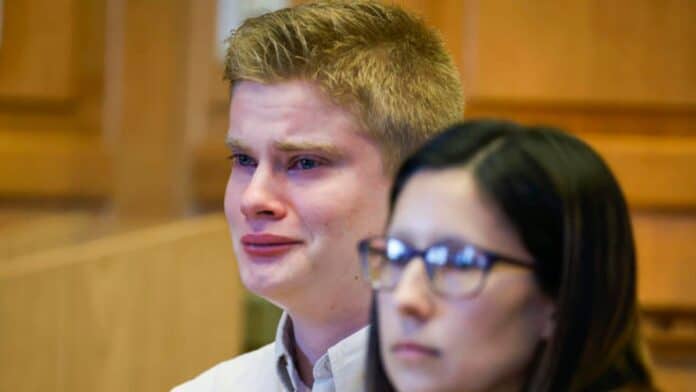Tragically, Jeremy Goodale, an 18-year-old from Iowa, was found guilty of killing Nohema Graber, his high school Spanish teacher, and was given a life sentence. More than two years ago, Graber was the victim of a violent attack by Goodale and his accomplice, Willard Miller, because of a failing grade.

Nohema Graber’s journey from Mexico to Fairfield, her teaching career, and her life at Fairfield High School abruptly ended on that fateful day in November 2021. The events leading up to her tragic death revealed the depth of the tragedy.
Nohema Graber, a dedicated teacher at Fairfield High School, became the unfortunate victim of a sinister plot when Miller’s failing grade in her Spanish class led to a deadly confrontation. Miller wanted to study abroad, but his unsatisfactory grade might prevent him from doing so. This was the driving force behind the crime.
Goodale and Miller entered guilty pleas to charges of first-degree murder; however, the distinctions between their roles were made evident during sentencing. Judge Shawn Showers sentenced Goodale to life in prison with the possibility of release in 25 years after taking into account 25 factors. This decision underscores the importance of extensive rehabilitation.
During the sentencing, Goodale expressed deep remorse, acknowledging the irreparable loss he caused. Judge Showers noted Goodale’s acceptance of responsibility and remorse, differentiating him from Miller, who received a harsher sentence. The emotional apology from Goodale, though met with skepticism from some of Graber’s family, shed light on the complexity of remorse in such cases.
Also Read: Teacher Abigail Zwerner Describes Grueling Recovery After Shot By 6 Year Old
Graber’s family, already devastated by the loss of Nohema, faced additional challenges with the subsequent death of Paul Graber, Nohema’s husband. Victim impact statements emphasized the profound impact the incident had on the family, haunting them for the past two years.
Prosecutor Chauncey Moulding expressed satisfaction with the sentence, acknowledging Goodale’s potential for rehabilitation. However, the case raised questions about juvenile sentencing laws, with Iowa limitations preventing mandatory life sentences for individuals like Miller.
The meticulous planning and execution of the crime involved a meeting at the school, followed by the fatal incident in a park. The discovery of Graber’s body and subsequent arrests were fueled by social media evidence, uncovering Goodale’s admissions and motives.
The role of social media, particularly Snapchat, played a crucial role in the investigation. Messages exchanged between Goodale and others detailed the motive, planning, and execution of Graber’s murder, providing key evidence for the prosecution.
Judge Showers’ decision to try both teens as adults raised eyebrows, highlighting the limitations of Iowa law regarding mandatory life sentences for juveniles. By using this legal strategy, the seriousness of the crime would be held accountable.
Despite the severity of the crime, Judge Showers emphasized rehabilitation for Goodale, citing his remorse and acceptance of responsibility. Goodale’s acknowledgment of letting down his family, especially his father, added a human element to the courtroom proceedings.
Opinions within Graber’s family varied, with some questioning the sincerity of Goodale’s remorse. While Tom Graber, the brother of Nohema’s husband, expressed skepticism, others, like Jim Graber, extended forgiveness, hoping for Goodale’s spiritual growth and salvation.

